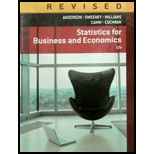
Charity Navigator is America’s leading independent charity evaluator. The following data show the total expenses ($), the percentage of the total budget spent on administrative expenses, the percentage spent on fundraising, and the percentage spent on program expenses for 10 supersized charities (Charity Navigator website, April 12, 2012). Administrative expenses include overhead, administrative staff and associated costs, and organizational meetings. Fundraising expenses are what a charity spends to raise money, and program expenses are what the charity spends on the programs and services it exists to deliver. The sum of the three percentages does not add to 100% because of rounding.
| Charity | Total Expenses ($) | Administrative Expenses (%) | Fundraising Expenses (%) | Program Expenses (%) |
| American Red Cross | 3,354,177,445 | 3.9 | 3.8 | 92.1 |
| World Vision | 1,205,887,020 | 4.0 | 7.5 | 88.3 |
| Smithsonian Institution | 1,080,995,083 | 23.5 | 2.6 | 73.7 |
| Food For The Poor | 1,050,829,851 | .7 | 2.4 | 96.8 |
| American Cancer Society | 1,003,781,897 | 6.1 | 22.2 | 71.6 |
| Volunteers of America | 929,158,968 | 8.6 | 1.9 | 89.4 |
| Dana-Farber Cancer Institute | 877,321,613 | 13.1 | 1.6 | 85.2 |
| AmeriCares | 854,604,824 | .4 | .7 | 98.8 |
| ALSAC—St. Jude Children’s Research Hospital | 829,662,076 | 9.6 | 16.9 | 73.4 |
| City of Hope | 736,176,619 | 13.7 | 3.0 | 83.1 |
- a. Develop a
scatter diagram with fundraising expenses (%) on the horizontal axis and program expenses (%) on the vertical axis. Looking at the data, do there appear to be any outliers and/or influential observations? - b. Develop an estimated regression equation that could be used to predict program expenses (%) given fundraising expenses (%).
- c. Does the value for the slope of the estimated regression equation make sense in the context of this problem situation?
- d. Use residual analysis to determine whether any outliers and/or influential observations are present. Briefly summarize your findings and conclusions.
Trending nowThis is a popular solution!

Chapter 14 Solutions
Statistics for Business & Economics, Revised (MindTap Course List)
- AP1.1 You look at real estate ads for houses in Sarasota, Florida. Many houses range from $200,000 to $400,000 in price. The few houses on the water, however, have prices up to $15 million. Which of the following statements best describes the distribution of home prices in Sarasota? The distribution is most likely skewed to the left, and the mean is greater than the median. The distribution is most likely skewed to the left, and the mean is less than the median. The distribution is roughly symmetric with a few high outliers, and the mean is approximately equal to the median. The distribution is most likely skewed to the right, and the mean is greater than the median. The distribution is most likely skewed to the right, and the mean is less than the median.arrow_forwardDuring busy political seasons, many opinion polls are conducted. In apresidential race, how do you think the participants in polls are generally selected?Discuss any issues regarding simple random, stratified, systematic, cluster, andconvenience sampling in these polls. What about other types of polls, besides political?arrow_forwardPlease could you explain why 0.5 was added to each upper limpit of the intervals.Thanksarrow_forward
- 28. (a) Under what conditions do we say that two random variables X and Y are independent? (b) Demonstrate that if X and Y are independent, then it follows that E(XY) = E(X)E(Y); (e) Show by a counter example that the converse of (ii) is not necessarily true.arrow_forward1. Let X and Y be random variables and suppose that A = F. Prove that Z XI(A)+YI(A) is a random variable.arrow_forward30. (a) What is meant by the term "product measur"? ANDarrow_forward
 Holt Mcdougal Larson Pre-algebra: Student Edition...AlgebraISBN:9780547587776Author:HOLT MCDOUGALPublisher:HOLT MCDOUGAL
Holt Mcdougal Larson Pre-algebra: Student Edition...AlgebraISBN:9780547587776Author:HOLT MCDOUGALPublisher:HOLT MCDOUGAL
